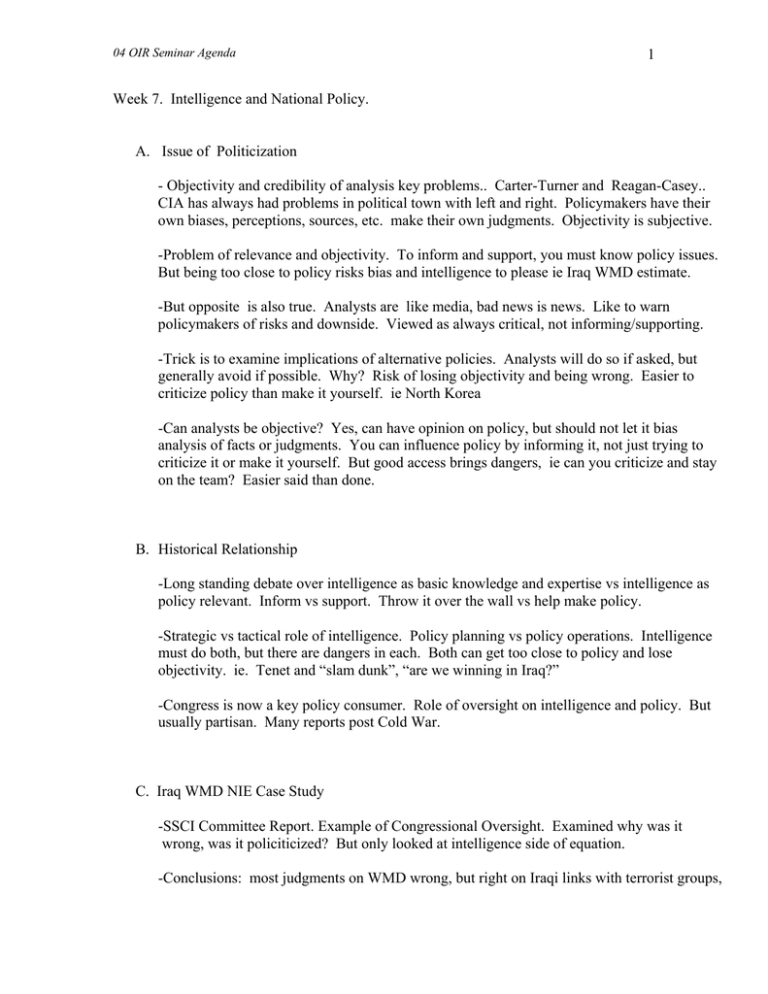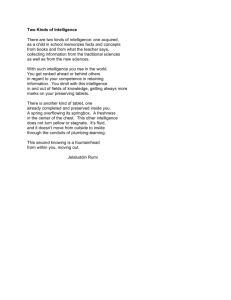1 Week 7. Intelligence and National Policy.
advertisement

04 OIR Seminar Agenda 1 Week 7. Intelligence and National Policy. A. Issue of Politicization - Objectivity and credibility of analysis key problems.. Carter-Turner and Reagan-Casey.. CIA has always had problems in political town with left and right. Policymakers have their own biases, perceptions, sources, etc. make their own judgments. Objectivity is subjective. -Problem of relevance and objectivity. To inform and support, you must know policy issues. But being too close to policy risks bias and intelligence to please ie Iraq WMD estimate. -But opposite is also true. Analysts are like media, bad news is news. Like to warn policymakers of risks and downside. Viewed as always critical, not informing/supporting. -Trick is to examine implications of alternative policies. Analysts will do so if asked, but generally avoid if possible. Why? Risk of losing objectivity and being wrong. Easier to criticize policy than make it yourself. ie North Korea -Can analysts be objective? Yes, can have opinion on policy, but should not let it bias analysis of facts or judgments. You can influence policy by informing it, not just trying to criticize it or make it yourself. But good access brings dangers, ie can you criticize and stay on the team? Easier said than done. B. Historical Relationship -Long standing debate over intelligence as basic knowledge and expertise vs intelligence as policy relevant. Inform vs support. Throw it over the wall vs help make policy. -Strategic vs tactical role of intelligence. Policy planning vs policy operations. Intelligence must do both, but there are dangers in each. Both can get too close to policy and lose objectivity. ie. Tenet and “slam dunk”, “are we winning in Iraq?” -Congress is now a key policy consumer. Role of oversight on intelligence and policy. But usually partisan. Many reports post Cold War. C. Iraq WMD NIE Case Study -SSCI Committee Report. Example of Congressional Oversight. Examined why was it wrong, was it policiticized? But only looked at intelligence side of equation. -Conclusions: most judgments on WMD wrong, but right on Iraqi links with terrorist groups, 04 OIR Seminar Agenda 2 including al Qaida. The analysis was not politicized. Critics of Iraqi policy focus on the former, ignore the latter. -Why was analysis wrong? Previous conclusions became unstated hypotheses. Judgments got layered. Uncertainties and gaps not stated. Alternative analysis/scenarios not done. Poor sources used . Data and doubts not shared. Too much reliance on liaison sources. Lack of good unilateral humint. -Context of NIE. Previous underestimate of Iraq WMD before Desert Storm. Rumsfeld and Jeremiah reports criticized best case/ most likely case analysis. Hard to prove alternative case. ie Iraq had no WMD. UN inspections hindered. Defectors give mixed messages. Safer to assume worse case. State and “not proven”. Hindsight 20-20. -Was Tenet bias? Slam dunk statement. Did not chair NFIB. Georgetown speech etc. Did Cheney influence analysis? DOD Special Plans Unit. Right to question analysis, seek alternative evidence and interpretation. -Conclusion. Rare case of Intelligence failure, unlike 911. Policy successes and intelligence failures. D. Key Issues -Need for competitive analysis. Risk of too much centralization. ie. DNI Issue Centers. -Can risk of politicization be minimized by structures/process or only by personalities?

